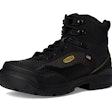Angered over two federal raids at Gibson Guitars over the past two years, lawmakers and the company's CEO are attacking the Lacey Act, which was amended in May 2008 to bar illegally logged wood from entering the U.S.
Four House Republicans-Fred Upton (Mich.), Cliff Stearns (Fla.), Mary Bono Mack (Calif.) and Marsha Blackburn (Tenn.)-are assailing the act as a "job killer," while, according to The Wall Street Journal, Gibson Guitar CEO and Chairman Henry Juszkiewicz is seeking to have the act amended so there are clearer guidelines on "due care."
The politicians characterized the raid as "heavy-handed" in a Sept. 8 letter to the Department of the Interior (DOI), Department of Justice (DOJ) and U.S. Fish and Wildlife Service. They also said "… your agencies and [the Obama] Administration are actively pursuing regulatory and legal policies that discourage job growth in the United States."
The DOJ and DOI responded to the Republicans' letter Sept. 19, pointing out, "A key reason for the broadly supported change in the law was that illegal logging practices have a negative impact on U.S. businesses that operate by the rules." Responding to the representatives' assertion that its tactics were "heavy-handed," DOJ and DOI said: "Law enforcement agents are required to carry side arms during the execution of warrants for their own protection and generally wear clothing and badges identifying themselves as law enforcement." They also noted that SWAT personnel were not involved in the raid.
Deb Hawkinson, executive director of the Hardwood Federation, said that her group still fully supports the Lacey Act, and she feels "people are just jumping to conclusions when we really just don't have all the facts."
The investigation is still underway and no charges have been filed against Gibson or its employees. Citing a federal affidavit, Reuters said U.S. Customs agents detained a shipment of sawn ebony logs from India in June; the accompanying paperwork fraudulently identified the shipment as Indian ebony fingerboards but did not name Gibson. Gibson's Juszkiewicz has "inferred" from investigators that the alleged wrongdoing involves Indian rosewood and ebony guitar fingerboard blanks that were "partially finished" in India and then imported to the U.S. by Gibson. "Indian law … requires that all the work be done in India before it's exported," he said.
"There is concern in the industry with how the agencies have handled the Gibson case," Hawkinson said, "but … it's really just their basic protocol, based on the [Sept. 19] letter. They didn't do anything new and different."
The Hardwood Federation is a Washington, D.C.-based lobbying group, with members including the NWFA, National Hardwood Lumber Association, and Appalachian Hardwood Manufacturers Inc., among others. A full list of its members can be viewed here.
The Lacey Act still retains support in Congress. "Enforcement of the Lacey Act's ban on the importation of illegally-harvested wood products is essential for the American forest products industry's success," said Rep. Earl Blumenauer (D-Ore.) in a statement. "Before we amended the Lacey Act with bipartisan support in 2008 to cover illegally harvested timber, that industry was losing more than $1 billion a year in lost opportunities and lower prices."
The act recently netted the U.S. a silver place in the 2011 Future Policy Awards as one of the world's "most inspiring and innovative forest policies." The amended Lacey Act is the first law in the world to prohibit trade in wood products made from trees that were illegally harvested, according to the Environmental Investigation Agency.
"Lacey is good for our industry," Hawkinson added. "We stand by the principals of Lacey. We stand by what that law is intended to do, and that law is intended to stop illegal products from entering the U.S., and the world marketplace."
Update, Sept. 26: Responding to allegations that its raid on Gibson Guitars was wanton, the U.S. Fish and Wildlife Service wrote in a recent blog post that its raids are "initiated and overseen by law enforcement professionals, following all legal procedures." Also, responding to fears that individuals would be targeted for trafficking products containing illegally logged materials, the agency said "Under the Lacey Act, we focus our law enforcement where it counts: Principally, on those who knowingly transact in larger volumes of illegal products. People who, despite exercising due care as consumers, unknowingly possess a consumer product, like a musical instrument or other object containing wood that may have been illegally obtained, do not have criminal exposure."






















